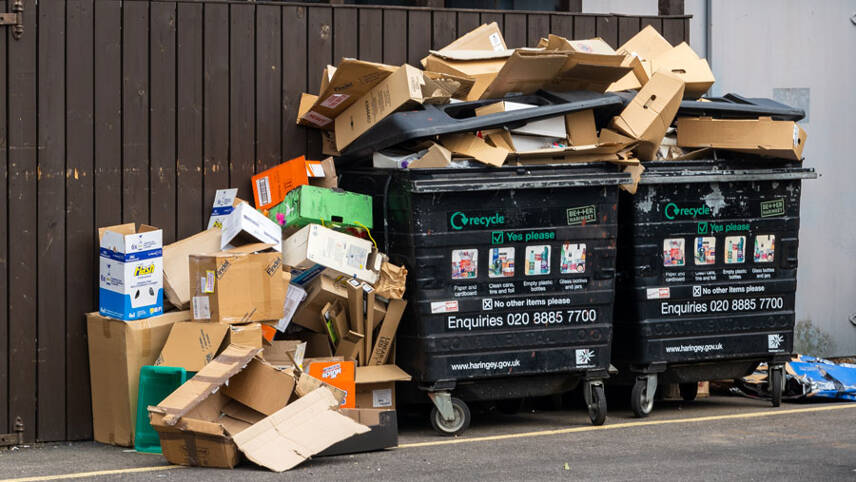Register for free and continue reading
Join our growing army of changemakers and get unlimited access to our premium content

The body, responsible for auditing public sector bodies, has today (30 June) published an assessment of the Government’s preparedness to deliver the targets outlined in the Resource and Waste Strategy.
Published in late 2018, the Strategy marked the first major update to policymaking in this field in more than a decade. But it has been plagued by delays during the pandemic. Several key facets, including unified household recycling collections and a deposit return scheme for drinks containers have been pushed back more than a year.
While the NAO acknowledges that the Government “cannot plan every step in detail now” to deliver ambitions of halving waste by 2042, it concludes that the continued delays are leaving businesses ill-prepared for future changes – and deterring potential investment in sectors such as reusable packaging and next-generation recycling technologies.
The NAO’s conclusion is that the Government’s delivery plans for the strategy remain “ineffective” and “not as developed as we would expect”. Its report expresses concern that the Department for Food, the Environment and Rural Affairs (Defra) is far from ending its culture of delay.
The report states: “[Defra] has not yet identified a clear outline path to achieving all of its resources and waste ambitions: it does not know when decisions about new interventions need to be made by in order to ensure realistic timeframes for design, testing and implementation, nor does it know, in broad terms, what sequencing of interventions is likely to produce most benefit over the long-term.”
A Defra spokesperson told edie that more updates will be provided on long-term plans “shortly”.
Cost inefficiencies
Defra gets some credit from the NAO for identifying parts of the Resources and Waste Strategy to prioritise and setting out refreshed plans for consultation. These include extended producer responsibility (EPR) scheme updates for packaging.
But the NAO is concerned that this more needs to be done to set the direction of travel. And warnings pepper the report about the potential cost inefficiencies of disorganised delivery of the Strategy.
It states: “The amount of household, commercial and industrial, construction and demolition waste we produce and what we do with it has economic and environmental consequences. Local authorities in England spent £4.9 billion on managing waste in 2021-22, £3.8 billion when accounting for income.”
It adds: “Defra spent more than £130 million on resources and waste work between April 2019 and March 2023, including on grants to other organisations.”
Public Accounts Committee chair Meg Hillier MP said: “We all need to reduce waste and recycle more to protect our environment. However, today the NAO reports that having missed its 2020 target on household recycling, Defra still lacks good long-term delivery plans for its work on waste.
“It’s another example of Defra’s culture of delay. Nearly five years on from its 2018 strategy, Defra has much to do before it can implement major reforms like the deposit return scheme. Defra must give households, local authorities and businesses the confidence they need to substantially change behaviours, or risk further setbacks to our environmental objectives.”
Responding to the report, a Defra spokesperson said the Department is “carefully considering” its recommendations.
They added: “We are pushing ahead with our programme of reforms to reduce waste and improve our use of resources – building on our commitments clearly set out in our Environment Improvement Plan earlier this year. This includes introducing a deposit return scheme for plastic and metal drinks containers from October 2025, implementing consistent recycling between different councils to boost recycling rates and banning the supply of single-use plastics like plastic plates and cutlery from October 2023.”
Responding to the report, waste management firm SUEZ’s chief external affairs and sustainability officer Dr Adam Read said: “We agree with the NAO that the time for decisive action is now, and that Defra must deliver on its commitments at pace, so we can make further progress on the work we are doing with our customers and suppliers to make the transition happen… the step change we need requires Government to provide more clarity on policies, governance structures, funding, timetables and metrics, along with a clear roadmap for achieving a decarbonised waste sector as we strive to deliver a net-zero society.”
Ecoveritas’ chief strategy officer Andrew McCaffery said: “Extended producer responsibility should be a shining beacon. Instead, we seem to be caught in a downward spiral of negativity, and you get that sense of déjà vu regarding proposed positive recycling and waste policy changes stalling.
“More recently, EPR’s rollout has been plagued by lobbying from producer associations calling for an urgent reconsideration. Admittedly, there is very little new information about the future, which is hugely frustrating for those who have worked hard. Still, concerns around cost-of-living and inflation targets were highlighted from the start. If the policy is good for the planet and the environment, we need the willpower to implement it, even when it is not universally popular. We must move away from the status quo and this inherent predisposition towards pessimism. We’re completely misjudging the power of the consumer in all of this.”


Please login or Register to leave a comment.